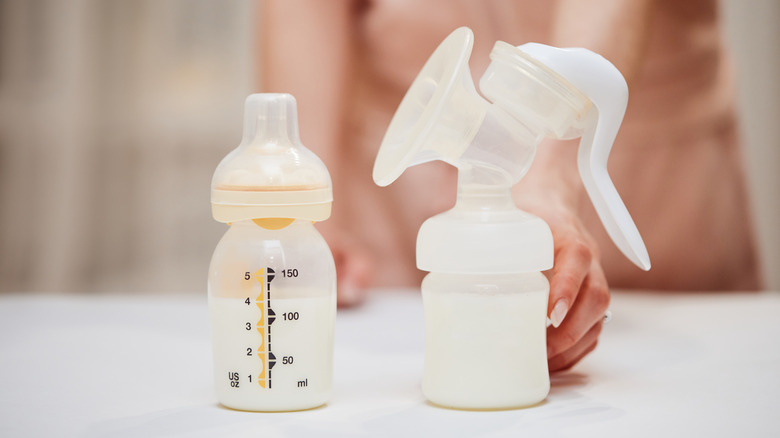All-Natural Ways To Help Increase Breastmilk Production
Having a newborn is a joyful and sometimes stressful time for most new moms. You want to soak up the little moments because, as the old saying goes, "the days are long, but the years are short." Nevertheless, life gets busy, and there is so much to learn and many adjustments to make. So go easy on yourself and remember whether it's your first baby or your fourth, some things are challenging for all moms, and breastfeeding is one of them.
"Breastfeeding may be natural, but it does not always come naturally. You and your baby are learning together," Abrie McCoy, a certified lactation consultant with SimpliFed, told The List. One of the difficulties many mothers face is having enough milk supply to keep their babies well-fed. Dr. Jessica Madden, pediatrician, neonatologist, and certified lactation consultant, says to have a successful breastfeeding journey, you should prepare for it while you are still pregnant. "This includes learning all about breastfeeding and milk production, watching and observing other women breastfeed, chatting with others about their personal breastfeeding experiences, and meeting lactation professionals ahead of time," Dr. Madden, who serves as medical director of Aeroflow Breastpumps, told us.
If you are expecting a newborn or are already breastfeeding and want to find ways to ensure you have a sufficient breastmilk supply, we've got you covered.
Breastfeed frequently
Breastfeeding provides healthy nutrition to your baby. The 2020-2025 U.S. Dietary Guidelines for Americans recommends that mothers exclusively breastfeed their babies for the first six months before introducing other foods. However, every baby is different, and every breastfeeding schedule will look different for moms wanting to increase their milk supply, especially in the early days of exclusive breastfeeding.
One of the best things to do when you start nursing is to ensure you feed your baby as much as possible. "First, we must understand that breastmilk production is based on demand," lactation consultant Abrie McCoy told The List. "Your body will produce for the demand that it is getting. If you are nursing or expressing milk ten times a day, your body will produce milk for that ten times."
To be well-nourished and grow, newborns need to eat every two to four hours, according to CDC. This means waking up at night to ensure babies can be fed and mothers can increase their milk supply. McCoy told The List that the bottom line is moms "must increase demand, whether its nursing or expressing, to increase the volume of milk that their body will supply."
Make sure baby has a good latch
One of the most challenging things new moms face is helping their baby latch onto their breasts correctly. If a baby latches well, milk can flow out, increasing the mother's breastmilk supply. But, according to postpartum doula Robyn Berman of Halifax, a poor latch may be why some moms are not producing enough milk. "First, I want to make sure that the mother has a deep, good latch and that the baby is drinking at the breast, not nibbling," Berman told Today's Parents. "I would encourage the mother to use breast compression (which means squeezing the breast between thumb and all four fingers as though she's hand-expressing into the baby's mouth as he nurses) with each feeding to maximize the baby's efficiency."
Lactation consultant Jacki Glover told the publication that good posture and technique may help with latching. "The mother needs to provide stability for the baby's shoulders, spine, and hips with no pressure on the baby's head, and the baby needs to be facing the mother and not having to turn his head to latch on," Glover explained. Babies cannot latch for many reasons, and this can sometimes be painful for moms. If you struggle to help your baby latch, getting an expert, like visiting a lactation consultant, will make a big difference.
Eat a healthy and balanced diet
You should aim to increase your calorie intake by 330 to 400 calories per day to nourish your baby and stay healthy while breastfeeding, according to the CDC. Although you may feel like you're too exhausted to monitor your meals, it's well worth it to ensure you're well-nourished.
Molly Petersen, a certified lactation counselor with Lansinoh, says certain foods may increase breastmilk supply. However, there isn't one magic food. "The best option is to eat a diet balanced between lean proteins, whole grains, and vegetables," Petersen told The List. "Maintaining your health and nutritional needs helps make it easier for your body to produce breastmilk. That's not to say that your favorite treat is off the table. Instead, enjoy the foods that make you happy and balance them with what your body needs."
Dr. Jessica Madden also advocates for a healthy and balanced diet. She told us that new moms should "eat ample green leafy vegetables, fruits, whole grains, protein, iron and healthy fats including omega-3 fatty acids, as these can help you to make more milk." In addition, Dr. Madden recommends increasing your intake of oatmeal, fennel, flaxseed, apricots, and dates.
Skin-to-skin contact makes a difference
Babies love to be close to their moms, and the great news is that this positively impacts breastfeeding. According to a 2020 study published in the International Breastfeeding Journal, mothers who had skin-to-skin contact with their newborns experienced a perceived increase in breastmilk supply. Even when babies slept in the same room as their moms, their mothers seemed to produce more milk. The study also found that the positive impact of skin-to-skin meant babies latched better.
According to lactation consultant Abrie McCoy, skin-to-skin is "magical." McCoy told The List that skin-to-skin supports temperature regulation, heart rate regulation, and essential hormone production. "Some of these hormones that can be boosted with skin-to-skin are prolactin and oxytocin, which are some of the driving forces in lactation," McCoy explained.
Creating a skin-to-skin routine during the first few weeks after giving birth helps set new moms up for success, as it solidifies the bonding between you and your baby and has many extra benefits. "To have ample time to focus on breastfeeding and 'skin-to-skin' care, it's important to have help with all other aspects of life during the postpartum period," pediatrician and lactation specialist Dr. Jessica Madden told The List. "This includes assistance with cooking, cleaning, other household chores, and care of older children."
Stay hydrated
As a nursing mom, you should keep a bottle of water nearby when breastfeeding because your fluid needs will increase. You should aim to drink at least 16 cups of water a day because your consumption of water is needed by your baby, too, since water makes up 75% of the body weight of a newborn baby, and breastmilk is your baby's way of getting both nutrition and water, according to WebMD. Dr. Jessica Madden told The List, "This can usually be accomplished by drinking based on thirst, but in some cases, it might be helpful to keep track to make sure you drink enough."
Your intake of water can also impact the quality of your breastmilk. "Breastmilk consists mostly of water. So, therefore, making sure you drink plenty of water when you're breastfeeding is important," certified lactation counselor Molly Petersen told us. "Many people are underhydrated and don't even know it."
Find ways to relax, get quality sleep, and avoid stress
Most moms undoubtedly get tired of hearing that they should sleep when the baby sleeps; however, this advice is golden, particularly for exhausted breastfeeding moms. Doing your best to get good quality sleep will make a big difference, as good sleep patterns positively impact breastfeeding. For example, a 2020 study published in The American Journal of Maternal Child Nursing found that poor sleep quality resulted in lower milk volume.
Besides sleeping, it's also essential to look after yourself and keep stress to a minimum. A 2012 study published in Advances in Preventive Medicine found that stressful life events during pregnancy can negatively impact the breastfeeding process. Certified lactation counselor Molly Petersen told The List that avoiding stress when breastfeeding is necessary. "Not the easiest advice for a new parent, I know!" she admits. However, she says it's essential to try and manage your emotions during this time. "Breastfeeding is a process controlled by hormones, and the hormones associated with stress can throw a wrench in the breastfeeding works," Petersen explained.
Petersen further recommends self-care: "Take a few minutes to enjoy a hobby, meditate, or step outside. Even a short de-stressing period can help."
Set breastfeeding goals and seek expert help when you need it
Having a new baby is an emotional rollercoaster, and breastfeeding can be frustrating for many moms. "Overall, having a new baby is a chaotic, messy, beautiful, and rewarding time in a parent's life. Breastfeeding is another aspect of the ride," certified lactation counselor Molly Petersen told The List. "It can be helpful to set breastfeeding goals and work to meet them."
Keeping positive and remembering how far you've come since pregnancy is helpful. "It's also important to celebrate the wins along the way, and don't be hard on yourself about the misses," advised Petersen. "At the end of the day, each parent is just trying to do what's best for them and their baby. You're doing great, mama!"
Certified lactation counselor Abrie McCoy added that it's important for new moms to trust their bodies and reach out to a lactation professional if they need help. "We often compare, quantify, and doubt our body's ability to nurture our children," she acknowledged. "You got this!"
Breastfeed from both breasts during each feeding
It's hard to know how to feed your baby correctly when you are a new mom, and many moms breastfeed their newborns by emptying one breast during a feed. However, to ensure that both breasts continue to produce a sufficient amount of milk, experts recommend to breastfeed from both breasts by alternating breasts during the same feeding session (via Verywell Family). In addition, a study published in Breastfeeding Medicine found that expressing milk from both breasts increased milk production. Another advantage of offering both breasts to your newborn older baby during night feeds is that it keeps your baby nursing for longer, according to Verywell Family.
The best way to breastfeed in the early days is to follow your baby's needs and offer both breasts to your baby. The Office of Women's Health recommends keeping your little one on the first breast until nursing slows or stops. At that point, switch to your other breast.
Get a breast pump
When you're a new mom, purchasing unneeded items is a common mistake — but a good breast pump is not one of those things. If you want to produce more milk, a breast pump will help you achieve this goal. "Whether you're exclusively pumping or you're pumping in addition to breastfeeding, pumping sessions can help boost your supply," Molly Petersen, a certified lactation counselor, told The List. "If your baby only feeds on one breast per session, you can pump the other side. You can try adding pumping sessions between feedings to build up a freezer stash and to tell your body that it needs to make more milk." If you are exclusively pumping, Petersen recommends sticking to a consistent schedule.
If you do decide to use a breast pump, it is essential to get the right one for you and ensure your pump is still working correctly. Lactation consultant Abrie McCoy explained that it's not uncommon for parents to notice a reduced breastmilk supply after exclusively pumping for a while. "[This is] because there are pump parts that must be replaced to continue optimal function and suction for the pump," she told The List. In addition, it's a good idea to look at the breast shield size of your breast pump and see if the speed of suction suits your needs (via Healthline).
Don't skip early morning feedings
Waking up multiple times in the middle of the night to feed a baby is tiring, but it is one of the best ways to ensure your milk supply is strong. Dr. Jessica Madden, board-certified pediatrician and lactation consultant, says it's vital moms do not skip night breastfeeding sessions. "Women who are lactating experience a spike in prolactin in the wee hours of the night, usually between 2-4 a.m. Prolactin, like oxytocin, is a major hormone in breastmilk production. Breastfeeding or pumping during the timing of the natural prolactin surge (2-4 a.m.) will help to boost your milk supply," she told The List.
Certified lactation counselor Molly Petersen added, "One of the best ways to establish and maintain a healthy breastmilk supply is to watch for and follow your baby's hunger cues." According to Petersen, young babies tend to open and close their mouths, stick out their tongues, and bob and down, looking for the nipple when hungry. Older babies do the same thing as younger babies but will also bring their hands or place other items into their mouths. "Offering baby your breast when they show hunger cues allows your body to respond to their nutritional needs and create a good milk supply," advised Petersen.
Breast stimulation like a breast massage can help
Breast stimulation, like a breast massage, can help increase breastmilk and improve milk quality. A study published in the Journal of Pediatric Gastroenterology and Nutrition found that new moms who massaged their breasts had significant benefits in increasing the quality of their breastmilk's contents, offering potential benefits to the growth and development of babies. "Milk supply is established via frequent breastfeeding," pediatrician Pierrette Mimi Poinsett told WebMD. "Hand massage during feeding can help with let-down and milk flow."
For many breastfeeding women, clogged ducts and engorgement can be painful and challenging, causing some women to stop breastfeeding together. To help with milk flow, experts recommend knowing how to massage breasts by hand over using products. "Effective breast massage techniques include circular motion on the breast with gentle pressure, starting at the base of the breast out to the nipple," advised Dr. Poinsett. "Also massage the breast in a linear fashion, from the chest to the tip of the nipple. Finally, compressing the breast by holding the breast in the 'C' position — little finger touching the chest, thumb and index finger holding the breast — can help improve breast milk removal."
Know what to avoid and limit
After nine months of not drinking alcohol and eating sushi, you may be tired of dietary restrictions. The good news is that while breastfeeding, there are fewer foods and beverages to avoid. Nevertheless, the FDA still recommends avoiding fish containing high levels of mercury, such as tuna, marlin, and swordfish.
When it comes to alcohol, it is still considered best to avoid it while breastfeeding. This is the safest course of action for breastfeeding moms, as there is limited research on the effects of alcohol while breastfeeding. However, the CDC does say having one alcoholic beverage per day is not thought to be harmful — although you should wait a minimum of two hours after consuming alcohol before nursing. Having any more alcohol than that can potentially negatively impact your supply, as well as lead to numerous developmental problems in your infant.
As far as coffee is concerned, you have the green light to enjoy your favorite cup of joe while breastfeeding, according to the CDC. You'll just want to avoid drinking large amounts; limit your daily caffeine intake to about 300 milligrams or less, which is about 2 to 3 cups of coffee. As some caffeine will pass into your breastmilk, having too many cups of coffee or other caffeinated beverages can impact your baby's behavior and feeding. If you notice your baby is fussy after you drink coffee, the CDC advises limiting the amount you consume.












